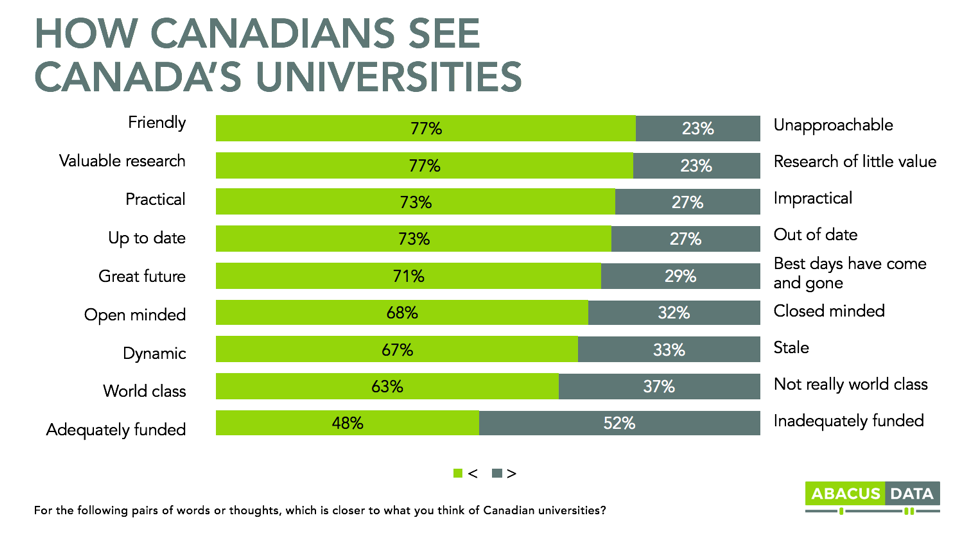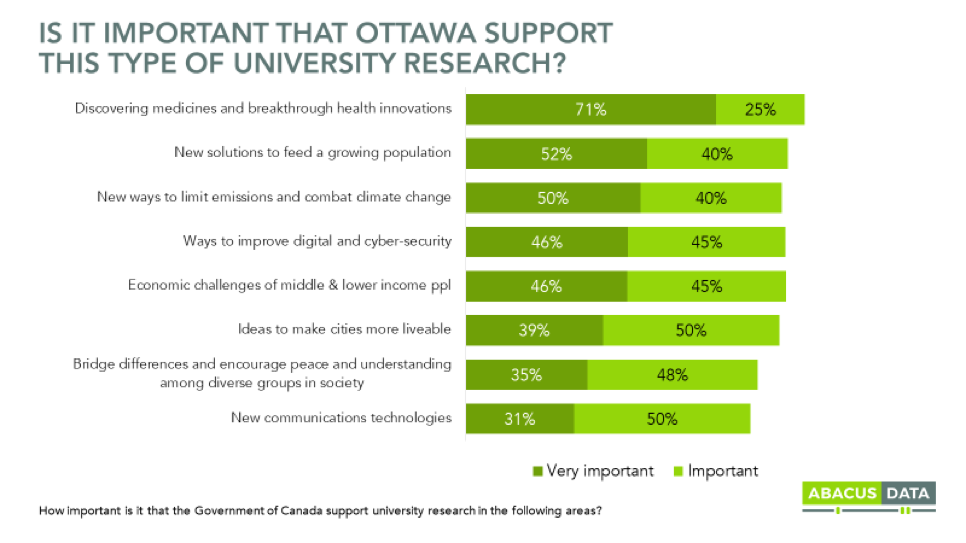Universities Canada finds ally in public to support Naylor agenda
Public generally favours university research: Survey
A recent survey of public perception about university research is overwhelming positive. So encouraging are the results that Universities Canada, which commissioned the survey, is hoping it can get the public to rally behind it to press the government for more funding for university research.
The online survey of 1,500 Canadians aged 18 and above shows that Canadians are generally appreciative of the kind of work that universities do, particularly their research activities. Seventy-seven per cent of respondents say universities conduct valuable research. They also think that universities are up-to-date (says 73% of respondents), dynamic (67%) and world-class (63%). However, only 48% of respondents view universities as being adequately funded.
 Reprinted with permission of Universities Canada and Abacus Data
Reprinted with permission of Universities Canada and Abacus DataConducted by Abacus Data, the survey shows that more than 80% of respondents think Ottawa should support university research. Asked about what type of research Ottawa should support, medicine and health innovations are at the top of the list for 71% of respondents. Closely related to this type is research addressing the issue of a growing population (52%). Other topics of research that interest the respondents included climate change (50%), digital and cyber security (46%) and economic challenges (46%).
Paul Davidson, president of Universities Canada, says his organization doesn’t usually conduct public opinion polls, but they have done so recently in time for some Canadian milestones. Prior to this year’s survey, their last survey was in 2015, shortly before the federal elections. This year, the poll was conducted in summer after the Canada’s Fundamental Science Review, popularly known as the Naylor report, was released in April.
For these two surveys, Davidson says the aim was to learn more about the public’s attitude towards universities and higher education. The latest survey also included questions about the universities’ research agenda, the value of research and the value of investing in it.
“I’m very impressed and pleased with the results,” says Davidson. “On virtually every measure, Canadians have extremely high confidence about the value of universities (and) post-secondary education and the contribution of research to Canada’s future. That’s a positive set of data.”
Davidson says Universities Canada and universities are going to use the survey results in their communications, advocacy and outreach to the public to garner high levels of support for investments in research, forming the organization’s advocacy efforts leading up to Budget 2018.
“I think what the polling shows is that the public is our ally. The public likes to see investments in health and the benefits of investments in the social science (and) investments in global migration challenges, … science and technology (and more). So the public is with us,” Davidson adds.
Universities Canada also shared the data with members of parliament for consideration in their spending priorities.
The survey also shows that Canadians want universities to focus their research on strengthening the competitiveness of the Canadian economy and what would make Canada a leader in innovation.
“Fully 85% believe that Canada has a chance to lead the world in higher education, research, and innovation, and 86% say the government of Canada should spend more on university research because the upside for Canada is tremendous,” states the report authored by Bruce Anderson, Abacus Data chairman.
[caption id="attachment_11514" align="aligncenter" width="600"] Reprinted with permission of Universities Canada and Abacus Data[/caption]
Reprinted with permission of Universities Canada and Abacus Data[/caption]
A group of future scientists is also pleased with the results of the survey and their implications on their advocacy. “The poll did suggest that the public would support the recommendations of the Naylor report, including reinvestments in fundamental research,” says Shawn McGuirk, co-president of Science & Policy Exchange (SPE), an advocacy group of graduate students and post-doctoral fellows in Montreal. The group is currently conducting a signature campaign to push for the implementation of the Naylor report recommendations.
“The survey results are a strong foundation to continue the work that we are doing,” says Vanessa Sung, SPE co-president. It is a challenge, though, to communicate the impact of research, particularly basic research, in a context that’s applicable to the average Canadian, she adds.
McGuirk says the public needs to understand the necessity for more funding because new money has not been made available for several years.
The survey results also support other issues advocated by the SPE, such as the need to further international collaboration. For example, 94% of respondents say they support investing in international university research collaboration and 94% say they support attracting the best international talents to Canadian universities to expose our students to world-class research.
R$
| Organizations: | |
| People: | |
| Topics: |
Events For Leaders in
Science, Tech, Innovation, and Policy
Discuss and learn from those in the know at our virtual and in-person events.
See Upcoming Events
You have 0 free articles remaining.
Don't miss out - start your free trial today.
Start your FREE trial Already a member? Log in
By using this website, you agree to our use of cookies. We use cookies to provide you with a great experience and to help our website run effectively in accordance with our Privacy Policy and Terms of Service.





